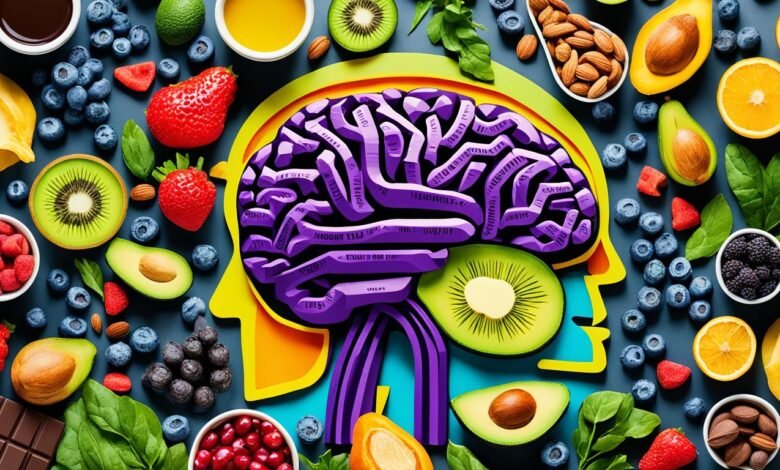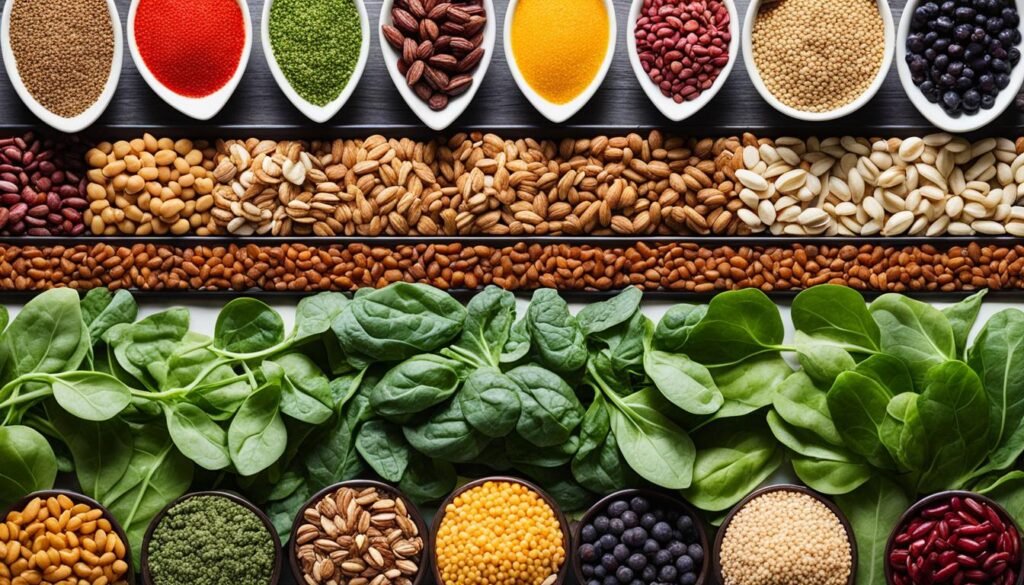
Want to boost your brain health and memory? Your kitchen is the key. Eating certain foods can feed your brain and boost memory. Nuts and seeds, salmon, beans, and more are great for your brain and memory. Doctors and dietitians recommend these as top foods for brain health.
These foods are full of nutrients that help your brain work well. They can improve memory and keep your brain sharp. So, include these foods in your diet for a big brain boost. Let’s explore the benefits of these amazing foods together!
Nuts and Seeds
Nuts and seeds are tasty snacks. They also help your brain. Eat walnuts, almonds, peanuts, sunflower seeds, and pumpkin seeds. They are good for your brain health.
These foods have a lot of protein. Protein is vital for brain health. It helps brain cells talk to each other. This makes your brain work better and helps you remember things.
Nuts and seeds also have omega fatty acids. These, like omega-3 and omega-6, keep your brain in shape. They help make cells and create communication points between them. This is key for your memory to work well.
Let’s look at the benefits of nuts and seeds in a table:
| Nut/Seed | Protein Content (per 100g) | Omega-3 Fatty Acids (per 100g) |
|---|---|---|
| Walnuts | 15g | 9g |
| Almonds | 21g | 0g |
| Peanuts | 26g | 0g |
| Sunflower Seeds | 20g | 0g |
| Pumpkin Seeds | 19g | 0g |
From the table, we see walnuts, almonds, and peanuts are rich in protein. Sunflower and pumpkin seeds have protein too. They bring omega fatty acids along with it.
If you want a snack that’s good for your brain, pick nuts or seeds. They have both protein and omega fatty acids. This mix helps your brain work better. It can help you learn and remember better.
Salmon
Eating foods rich in omega-3 fatty acids can make your brain work better. One great source of omega-3 is salmon. It’s both tasty and good for your brain.
Salmon has a lot of omega-3 fatty acids, especially DHA. This DHA is very important for your brain’s health and growth. It helps make the brain work well and improves your memory.
Studies show that eating foods like salmon can boost your memory. These healthy fats are great for your brain. They might even help protect it as you get older. This could lower your chances of having memory problems or Alzheimer’s.
| Benefits of Salmon for Brain and Memory | How It Works |
|---|---|
| Promotes Brain Health | Omega-3 fatty acids support the integrity and function of brain cells, promoting overall brain health. |
| Enhances Memory | DHA, a key component of omega-3s found in salmon, has been shown to aid memory formation and retrieval. |
| Reduces Cognitive Decline | Regular consumption of omega-3s may help slow down age-related mental decline and reduce the risk of cognitive impairments. |
| Protects Against Neurological Conditions | The anti-inflammatory properties of omega-3s may provide protection against neurodegenerative diseases like Alzheimer’s. |
Adding salmon to your meals is easy. You can grill, bake, or broil it. This makes for a tasty dish. Serve it with dark green veggies like spinach or kale. This adds to the brain-boosting effect. Eating salmon regularly can help your brain and memory with its omega-3s.
Beans
Beans are a great choice for a healthy brain. They are packed with nutrients like fiber, B vitamins, and omega fatty acids. These help with brain growth and work.
The fiber in beans keeps your blood sugar steady. This leads to even energy and sharp focus. Eating fiber-rich foods, such as beans, boosts your brain’s health and thinking skills.
B vitamins from beans help turn brain compounds into energy. They also help your brain make new memories. Vitamins like thiamine, riboflavin, and niacin help brain messages and memory.
Beans like black beans and chickpeas have omega-3 fatty acids too. Omega-3s are key for brain growth and function. They help build brain cell walls, improve brain messages, and keep your brain structure strong.
The Benefits of Beans for Brain Health
Beans are full of nutrients that help your brain:
- Fiber: Keeps blood sugar steady, aids focus and memory.
- B vitamins: Turn brain compounds into energy, help make new memories.
- Omega fatty acids: Crucial for brain growth and function maintenance.
Adding beans to your meals can boost your brain power. They offer many health advantages too.
| Bean Variety | Fiber Content (per cup) | B Vitamin Content (per cup) |
|---|---|---|
| Black Beans | 15 grams | Thiamine: 0.4 mg, Riboflavin: 0.2 mg |
| Pinto Beans | 15 grams | Thiamine: 0.4 mg, Niacin: 1.0 mg |
| Chickpeas (Garbanzo Beans) | 12 grams | Thiamine: 0.2 mg, Folate: 282 mcg |
Blueberries
Blueberries and other dark berries are full of antioxidants. These antioxidants protect our brains. They fight off free radicals and lower oxidative stress. This stress can cause our brains to decline and lead to diseases.
The antioxidants in blueberries help our brains work better. They improve how our brain cells talk to each other. This helps our thinking and remembering stay sharp.
Eating blueberries is great for your brain and memory. You can use them in a lot of tasty ways. Add them to smoothies, put them on cereal or yogurt, or just snack on them.
| Benefits of Blueberries | How They Benefit Brain Health |
|---|---|
| Rich in Antioxidants | Protect the brain from free radicals and oxidative stress |
| Enhance Neural Functioning | Improve communication within the brain |
| Promote Cognitive Performance | Support optimal brain function and memory retention |
| Delicious and Versatile | Enjoyed as a standalone snack or incorporated into various recipes |
Dark and Leafy Greens
Dark and leafy greens like kale, spinach, and broccoli are great for your brain health and memory. They are full of key nutrients that help your brain work well.
Vitamin E in these greens is vital for protecting your brain cells from harm. It fights against free radicals and keeps your brain cells healthy.
Folate is another important nutrient in dark and leafy greens. It helps with making DNA and neurotransmitters, which are crucial for memory and thinking.
Incorporating these greens into your meals can boost your vitamin E and folate intake. This, in turn, is good for your brain and memory. You can eat them in salads, cook them, or blend them into a smoothie.
Lean Red Meat
Love meat? Then, news about its brain-boosting benefits is great for you. Especially lean red meat, such as sirloin steak, can help your brain health. It’s full of iron, a mineral that’s vital for brain function. Iron helps produce neurotransmitters. These are messengers in your brain that work on your mood, memory, and focus. Iron also helps oxygenate the brain, ensuring it works at its best.
Remember, eating lean red meat should be done in moderation. Overdoing it can lead to health issues. So, for a healthy choice, mix it with lots of vegetables in your meals. This way, you eat a balanced diet.

Choose lean cuts when buying red meat. Sirloin steak, flank steak, and tenderloin are good options. They’re lower in fat, yet still high in iron. Cooking your lean red meat the right way is important for safety. It should be a treat rather than an everyday choice.
Avocados
Avocados are not just tasty; they’re also packed with omega fatty acids and vitamin E. These are vital for our brain’s health and protection.
Omega fatty acids are key for cell growth and brain improvement. They help build healthy brain cells and make our brain work better. Getting enough omega fatty acids is great for your brain and how well you think.
Vitamin E is a strong antioxidant that shields brain cell walls. It keeps harmful free radicals from hurting our brain’s cells. This helps keep the brain safe and working well for longer.
Adding avocados to your meals gives your brain what it needs to do its best. Avocados are easy to include in many dishes. You can put them in salads, sandwiches, or spread them on toast.
When you shop, remember to grab some avocados for your brain’s health!
Tomatoes
Tomatoes are a fantastic choice for keeping your brain sharp. They’re not just tasty but full of lycopene. This is a strong antioxidant that boosts brain health.
Lycopene helps regulate inflammation in the brain. Too much inflammation can harm your brain and is linked to diseases like Alzheimer’s. Eating tomatoes can fight oxidative stress, helping keep your brain fit and healthy.
Tomatoes are great for brain cell growth too. This growth is key for a sharp mind. By eating tomatoes often, you support brain health and brain function.

You can enjoy tomatoes in many ways, like in salads, sauces, or soups. Their high lycopene content is great for your brain. It helps with inflammation regulation and boosts brain cell growth. So, add tomatoes to your meals for a healthier brain.
Whole Grains
Eating whole grains is great for your brain. They are rich in complex carbohydrates, omega-3s, and B vitamins. These nutrients are awesome for brain health.
Complex carbohydrates give your brain steady energy. This is unlike simple carbs that make your energy levels spike and drop. With whole grains, your brain stays alert all day long.
Whole grains also have omega-3 fatty acids. Omega-3s are known to boost memory and thinking skills. They keep your brain sharp and focused.
B vitamins are abundant in whole grains too. They are key for your brain’s functions, helping it make new connections. This boosts your memory and keeps your brain healthy.
| Whole Grains Benefits for Brain Function |
|---|
| 1. Provides a steady supply of energy for the brain |
| 2. Supports memory and cognitive processes |
| 3. Aids in neurotransmitter synthesis and energy production |
Add foods like oats, quinoa, and whole wheat to your meals. Doing so will give your brain the nutrients it needs. This helps you think better and remember more.
Now, we’ll learn about how dark and leafy greens can power up your brain.
Conclusion
Eating the right foods can keep your brain healthy and improve your memory. Foods like walnuts and almonds are packed with nutrients. They include protein and omega fatty acids which are good for your brain.
Salmon is full of omega-3 fatty acids. These help your brain work better and can make your memory sharper. Beans offer fiber, B vitamins, and omega fatty acids. They too help with brain growth and memory.
Blueberries are full of antioxidants. These can fight off harmful stress and keep your brain working well. Dark, leafy greens have important nutrients like vitamin E and folate. They’re great for your brain’s health.
Lean red meat gives you vital iron. This helps make neurotransmitters for better focus and concentration. Avocados are also great. They have omega fatty acids and vitamin E that help your brain stay healthy.
Tomatoes are rich in lycopene. This is an antioxidant. It fights inflammation and aids in brain cell growth. Including whole grains in your meals is important. They offer complex carbohydrates, omega-3s, and B vitamins for your brain.
By adding these foods to your daily diet, you help your brain stay in top shape. This can also improve your memory. It’s always good to discuss your diet with a healthcare pro or a dietitian for the best advice.




